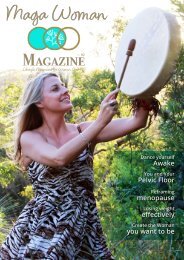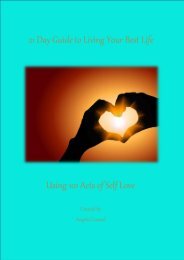Maga Woman Magazine - issue #1
Maga Woman Magazine is the magazine for women over the age of 45. No fluff in this magazine, it is full of useful information that will help you move into your next stage of life. It includes topics such as health and well-being, relationships, hormonal changes, spiritual growth plus much more. Life is meant to be lived to the fullest, the Maga Woman Magazine will help you do that.
Maga Woman Magazine is the magazine for women over the age of 45. No fluff in this magazine, it is full of useful information that will help you move into your next stage of life. It includes topics such as health and well-being, relationships, hormonal changes, spiritual growth plus much more. Life is meant to be lived to the fullest, the Maga Woman Magazine will help you do that.
You also want an ePaper? Increase the reach of your titles
YUMPU automatically turns print PDFs into web optimized ePapers that Google loves.
Vaginal Dryness — this occurs with<br />
the drop in oestrogen levels and is not<br />
only uncomfortable but can also increase<br />
the risk in vaginal infections. There can<br />
also be an impact on a woman’s sexual<br />
experience both physically and psychologically.<br />
Memory Problems — problems<br />
remembering things can be as a result<br />
of falling hormone levels but it is also associated<br />
with high stress and poor sleep<br />
patterns, all <strong>issue</strong>s that can worsen at<br />
this stage of life.<br />
Heart Palpitations — waking up with<br />
your heart racing can be a common occurrence<br />
even if you<br />
have a healthy heart.<br />
This is often triggered<br />
by a sudden lift in<br />
stress hormones or if<br />
it happens while you<br />
are asleep it could<br />
also be related to a<br />
drop in insulin levels.<br />
Given that heart<br />
disease is the biggest<br />
killer of women if you<br />
suffer from heart palpitations<br />
on a regular<br />
basis get your heart<br />
checked to make sure<br />
there is nothing else<br />
going on.<br />
Depression or Anxiety — many<br />
women can experience depression and/<br />
or anxiety at this stage of life. Often is<br />
can be related to high stress or worry<br />
about ageing. In our western culture<br />
there is a lot of negative beliefs around<br />
women growing older and this can cause<br />
women to feel like their life is over when<br />
their children leave home and they no<br />
longer in a full parenting role. There are<br />
many causes of depression and anxiety<br />
and one of the primary causes is feeling<br />
alone.<br />
Heavy bleeding — most women<br />
expect that as they transition through<br />
peri-menopause that their periods will<br />
get lighter until they stop all together.<br />
This is not what happens though. It is not<br />
unusual to have at least one significantly<br />
heavy bleed after several light bleeds,<br />
if you continue to have heavy bleeding<br />
please make sure you visit a health professional<br />
for further investigation.<br />
The menopause transition is different<br />
for every woman and while I have described<br />
some of the common physical<br />
symptoms that might occur, they might<br />
not happen for you. In the following article<br />
I will share with you some ways that you<br />
can manage your symptoms.<br />
Menopause is NOT a medical condition,<br />
it is a natural time of change that every<br />
woman goes through. Women can experience<br />
physical, emotional and spiritual<br />
changes during this time. If you see this<br />
stage of your life as a time to re-connect to<br />
the real you, often the part of you that you<br />
left behind in your teens or early twenties,<br />
then you often will transition through this<br />
stage of life with minimal <strong>issue</strong>s.<br />
Get ready to embrace the secret of<br />
menopause and celebrate your journey to<br />
the best version of yourself.<br />
Note — What I have described is the<br />
natural transition into menopause not<br />
medically/surgically induced menopause<br />
or premature ovarian failure which can<br />
happen a lot earlier than 45. Symptoms<br />
in these cases can be more severe due<br />
to the sudden stopping of reproductive<br />
hormones.<br />
15<br />
<strong>Maga</strong> Women <strong>Maga</strong>zine











